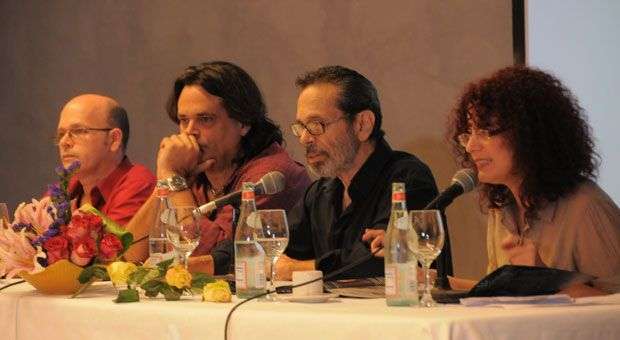Leo Brouwer prefers to celebrate his colleagues before better than kissing his own reflection in the mirror every morning, reminding himself how good he is. Perhaps because he knows he is great, and because he also has many friends, he can afford to bring to the chamber music festival named after him monsters that fill stadiums, by the modest price of their friendship.
“If I had to pay what they charge-what they are worth-I would have to start robbing banks,” Brouwer joked in a marathon press conference interrupted by jokes and incidental, in the usual counterpoint between the musician and his wife, the director and general producer of the event, Isabelle Hernandez.
She always refers to him as “The Master” and he invariably refers to it as “The Chief”. They are, according to Brouwer, like a yin and yang that complement each other in public and private, with the ultimate aim of promoting the work of an imperative of Cuban culture, especially the music and not just his: classical music.
In that endeavor, Leo Brouwer Festival of Chamber Music plays a key role, and the results are evident in the quantum leap from his proposal: from four concerts in 2009 to 20 now, with 300 guest musicians and fifty foreign including Paco de Lucia, an immortal who “revolutionized flamenco and plays guitar like he has 100 fingers”, as summarized by Brouwer.
For the first time this year, the festival goes out of Havana. In fact, it opens in Santiago de Cuba on September 24, with the Cello Plus concert by the duo Cello Capriccioso, by Cuban Douglas Vistel and German Almuth Krausser. By the way, is significant presence of Cuban performers who live in other countries including Joshua Tacoronte, which repeats the “Brouwer Flamenco”.
In Santiago the theoretical debates will begin, in this case with the premiere of works by Laureano Fuentes and Cratilio Guerra, two nineteenth-century Cuban composers with a strong legacy and sacred and scene music s, which has not been sufficiently heard, according to the researcher Miriam Escudero, a sort of Indiana Jones of early music in Cuba.
Before arriving in Havana, the festival will dedicate a concert to mark the half a century of the death of Ernesto Lecuona, with interpretation in Pinar del Rio of the The coffee plantation. The event is intended as a tribute to several individuals and institutions: the 160th anniversary of José Martí, the bicentenary of Giuseppe Verdi and Richard Wagner, the centenary of Benjamin Britten, Harold Gramatges and Bebo Valdés, and 90 of Italo Calvino.
But also there will be tributes to the living: the 100 years of Esther Borja, the 75 of Bobby Carcasses and Roberto Varela, and 70 of Pablito Milanes. Also planned are photographic exhibitions by Ivan Soca, Gabriel Guerra and Silvio Rodríguez, and a sample of the painters Eduardo “Choco” Roca Lescay and Nelson Alberto Dominguez, among others.
The festival will have a good dose of humor, with Concierto para dedo y orquesta by Osvaldo Doimeadiós. Brouwer assured OnCuba that he contacted Les Luthiers, Argentinean group that sublimated the union of humor and chamber music, but the parents of Johan Sebastian Mastropiero are no longer for these bustle.
To the old music lovers we will especially recommend Órgano plus… concert in the Church of San Francisco de Paula, with organist Vincent Bernhardt, which Brouwer defined with very Cuban symbiosis of theoretical wisdom and popular admiration: “He who plays the organ is a savage “.
Keep up with the festival require a kind of gift of ubiquity, and be aware of the presentations will be a utopian quest that is much worthy. And if it looks great, the next year promises to the presence here of monsters like Bobby McFerrin, the Spanish Jordi Savall or Fito Paez, a labor of love, rather love for Leo. The fact is that, as Brouwer said, “Better a friend than a bank account … although that does not hurt”










